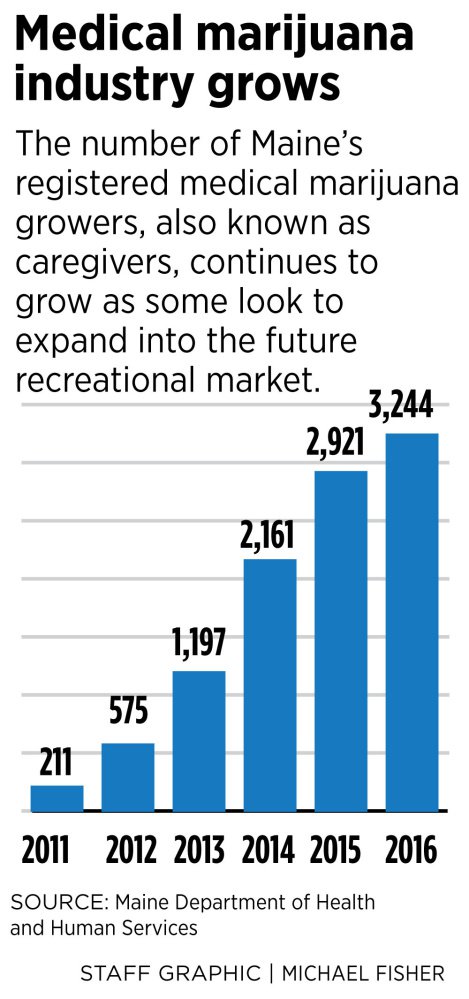The number of licensed medical marijuana growers jumped by 42 percent last year and existing caregivers took on thousands of additional patients, continuing the expansion of a cottage cannabis industry that has flourished in Maine over the past five years.
The continued growth of the medical program comes as state lawmakers set up a regulatory system to oversee a new adult-use cannabis retail market expected to open early next year. Industry insiders say the growth of the medical program in 2016 – which included nearly 1,000 new caregivers – is due in part to the passage of a recreational marijuana law, but also shows Mainers are increasingly turning to cannabis to treat chronic pain and other illnesses.
“It shows cannabis is a blooming small business in this state,” said Paul McCarrier, a longtime medical marijuana caregiver and an author of the recreational marijuana law. “I think a lot of people realize this can be a great opportunity to help people and provide care to them through cannabis. I think there are also people who want to get into the adult-use industry and the only way for them to get legal experience is through the medical marijuana program.”
Caregivers – small-scale growers allowed to grow marijuana for up to five patients – were once the only source of cannabis for patients who didn’t want to grow their own, but now operate alongside eight highly regulated dispensaries that opened in 2011. For the first decade after the state’s medical marijuana law was approved, patients either grew their own plants or designated a family member as a caregiver to do it for them. That changed in 2009, when amendments to the law allowed caregivers to serve up to five patients, not just their own family.
The medical cannabis industry in Maine has seen steady growth since 2011, when 211 caregivers were licensed to serve patients. By 2014, the number of caregivers reached 2,000 as demand increased from the growing number of patients who sought alternatives to pharmaceuticals. Last year, the number of registered caregivers licensed to grow medical marijuana for patients grew by 967, or more than 42 percent. There were 2,277 registered caregivers in January 2016 and 3,244 by December, according to data provided by the state Department of Health and Human Services, which oversees the Medical Use of Marijuana Program.
At the same time, caregivers increased their caregiver cards – or slots for patients – by nearly 50 percent, from 7,003 in January 2016 to 10,351 by December. Caregivers pay the state $240 per year per caregiver card. If a caregiver loses a patient, he or she has 10 days to refill that slot with a different certified patient.
Last year, medical providers printed 51,324 medical marijuana certificates for patients, according to the medical marijuana program. That may not represent the exact number of patients because state officials cannot say how many of those certificates are replacements or were printed by mistake. The state did not track the number of medical marijuana patients before 2016 and does not keep a registry of patient names.
Catherine Lewis, board chairman of the trade group Medical Marijuana Caregivers of Maine and a longtime caregiver in central Maine, said there are likely several factors behind the growing number of caregivers, including patient demand, more recognition of caregiving as a viable small business and the desire by some people to eventually move into the adult-use market.
“Some people from out of state are getting into the caregiver side thinking it will give them a leg up when the adult-use licenses become available,” she said.
As the November vote on recreational marijuana approached, rumors spread that the state may not register new caregivers or allow more caregiver cards, prompting some people to register or add slots, Lewis said.
“There are a lot of people who had been holding off on becoming caregivers and now they’re afraid that opportunity is going to be taken away,” she said.
The recreational legalization bill was written so it didn’t affect the medical program, but some caregivers and patients fear lawmakers will roll the programs into one regulatory system.
Hillary Lister, a medical marijuana patient advocate, said the increase in the number of caregivers is not surprising as more Mainers become certified patients and turn to caregivers for specialized medicine. Caregivers often specialize in specific strains – including some that do not produce a high – to treat their patients’ conditions and may provide medicine in a variety of forms, including tincture, salves and edibles.
Lister believes more people are becoming caregivers as the process becomes more clear and they are recognized as legitimate businesses. Caregivers must register with the state, pay sales tax, get pesticide handler licenses and stay up to date with regulations.
Advocates say the growing number of patients and caregivers illustrates why the state needs to continue to operate the medical program separately from recreational marijuana. Unlike under the adult-use program, medical patients are allowed to designate someone else to grow cannabis for them and are allowed to posses larger amounts. People under 21, including children, are allowed to become certified patients under the state’s medical program.
“Maine has one of the best medical (marijuana) programs in the entire world and definitely in our own country,” Lewis said. “We should not be throwing this away for adult use. We need to find a way to make both programs work together.
“We have 3,244 small businesses. What happens to them if the medical program goes away?”
Gillian Graham can be contacted at 791-6315 or at:
Twitter: grahamgillian
Send questions/comments to the editors.



